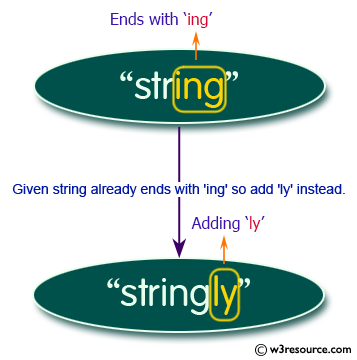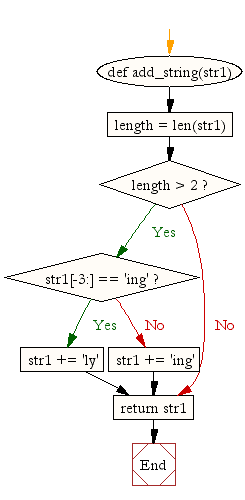Python: Add 'ing' at the end of a given string (length should be at least 3). If the given string already ends with 'ing' then add 'ly' instead. If the string length of the given string is less than 3, leave it unchanged
Add ing or ly to a string.
Write a Python program to add 'ing' at the end of a given string (length should be at least 3). If the given string already ends with 'ing' then add 'ly' instead. If the string length of the given string is less than 3, leave it unchanged.

Sample Solution:
Python Code:
# Define a function named add_string that takes one argument, 'str1'.
def add_string(str1):
# Get the length of the input string 'str1' and store it in the variable 'length'.
length = len(str1)
# Check if the length of 'str1' is greater than 2 characters.
if length > 2:
# If the last three characters of 'str1' are 'ing', add 'ly' to the end.
if str1[-3:] == 'ing':
str1 += 'ly'
else:
# If the last three characters are not 'ing', add 'ing' to the end.
str1 += 'ing'
# Return the modified 'str1'.
return str1
# Call the add_string function with different input strings and print the results.
print(add_string('ab')) # Output: 'ab'
print(add_string('abc')) # Output: 'abcing'
print(add_string('string')) # Output: 'stringly'
Sample Output:
ab abcing stringly
Flowchart:

For more Practice: Solve these Related Problems:
- Write a Python program to add 'ing' at the end of a string if its length is at least 3, or 'ly' if it already ends with 'ing'.
- Write a Python program to implement this transformation using a single return statement with a ternary operator.
- Write a Python program to check the string's ending and append the appropriate suffix using slicing.
- Write a Python program to use regular expressions to detect 'ing' at the end and modify the string accordingly.
Go to:
Previous: Write a Python program to get a single string from two given strings, separated by a space and swap the first two characters of each string.
Next: Write a Python program to find the first appearance of the substring 'not' and 'poor' from a given string, if 'bad' follows the 'poor', replace the whole 'not'...'poor' substring with 'good'. Return the resulting string.
Python Code Editor:
Contribute your code and comments through Disqus.
What is the difficulty level of this exercise?
Test your Programming skills with w3resource's quiz.
